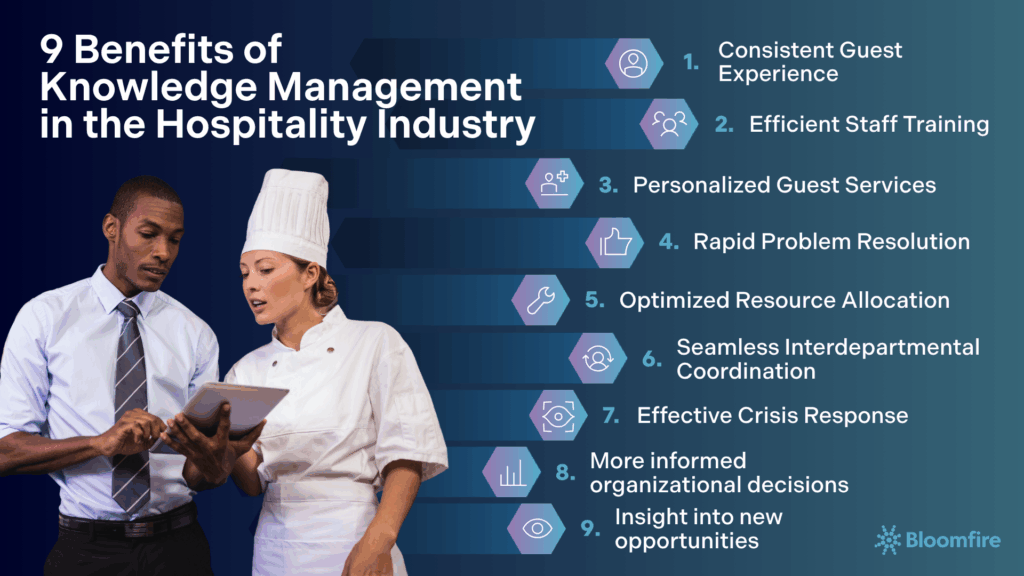Why Knowledge Management Matters in the Hospitality Industry

Customer experience forms the foundation of this multibillion-dollar industry that includes hotels, resorts, travel, tourism, food and drink, and attractions. Your guests now have more choices than ever before. The way you collect, organize, and use information can determine whether you earn their loyalty or lose their business.
Effective knowledge management in the hospitality industry can help your staff go above and beyond for guests, providing the service and experience they demand, and giving your establishment a competitive advantage. Learn more about the types and benefits of knowledge management in the hospitality industry below.
What Is Hospitality Knowledge Management and Why Does It Matter
A knowledge management solution is a system that allows your establishment to store and organize the collective knowledge of your workforce. This enables you to preserve workers’ knowledge even if they eventually leave your organization. In addition, it creates a centralized source of knowledge that employees can access to learn company policies, procedures, best practices, and other relevant job information.
The role of knowledge management in the service industry (which includes hospitality) is to provide employees with easy access to up-to-date, specialized knowledge. This is especially important in hospitality because the success of an establishment depends on providing guests with a great experience. If employees are slow to provide accurate information or solutions, the customer may be less likely to return, and may even demonstrate their dissatisfaction with a negative online review.
With a solid knowledge management framework, you can empower your workforce to respond to guests’ questions and issues with prompt, accurate information. Further, you can gain insight into customer data and trends so you can make fact-based organizational decisions to give your establishment an edge in a highly competitive environment.
Knowledge Categories in the Hospitality Industry
Understanding different types of knowledge can help you determine the best knowledge management strategy for your organization. Hospitality industry knowledge generally deals with the following categories:
- Task-specific knowledge: Encompasses any knowledge that is required to complete a particular task, including specific procedures, actions, or strategies. For example, a staff member uses task-specific knowledge when following the steps to check in a guest, make a reservation, or answer the phone with a standardized greeting. Generally, this information is included in training materials, like videos or handbooks.
- Tacit knowledge: Tacit knowledge is less by-the-book. Instead, it is knowledge that’s gained over time through personal experience and is usually challenging to articulate. This could include understanding the phrases and mannerisms to use to de-escalate a frustrated guest. While you may have a documented protocol for this type of situation, it’s usually only through experience that staff members can expertly finesse these complex interactions.
- Customer-related knowledge: Thanks to technology, hotels and other hospitality-related businesses today have a wealth of insight into customer data. Customer-related knowledge can include historical data (such as frequency and length of stays), demographic data (such as socio-economic status, age, occupation, etc.), and even preferences and behaviors.
- Network-related knowledge: In addition to customer data, your company can also gather knowledge about others in your network, such as competitors, vendors, and partners.
- Market-related knowledge: Goes one step broader than network-related knowledge. Equipped with market-related expertise and customer insights, organizations can gain a deeper understanding of the market within which they operate, including its size, population, culture, and habits. This can inform decisions about what products, services, and experiences to offer.
The strategic use of this information, transformed into practical knowledge, is vital for successful hospitality management. These knowledge types create systems that enable your team to deliver exceptional customer experiences while maintaining operational excellence.
9 Benefits of Knowledge Management in the Hospitality Industry
Knowledge management creates real business advantages in today’s competitive hospitality landscape. Thin margins and guests who want exceptional experiences make it essential to capture and use organizational knowledge. This directly affects operational efficiency and guest satisfaction. Here are the specific benefits that knowledge management brings to hospitality businesses.

1. Consistent guest experience
Loyal customers spend 67% more on average than new customers, according to BIA Advisory. In the hospitality industry, a consistent guest experience is a driving force of loyalty. A study by the Access Group indicates that excellent service is what makes almost 44% of customers return. In ensuring this capacity, your business must employ a seamless knowledge management solution.
To provide superior service to guests, staff members, and customer service representatives must be able to quickly access guest information, policies, procedures, and best practices. A knowledge management system enables all staff to quickly find the information they need to assist guests. The most efficient knowledge sharing solutions include advanced search features, which make it even easier to find the right information at the right time.
A solid knowledge management system helps deliver a unified and reliable experience to guests, whatever their interaction with your brand. This ensures consistent service across all touchpoints.
2. Efficient staff training
Effective knowledge management accelerates employee onboarding and development. New hires become more productive when training materials, best practices, and guides are consolidated in one place. This matters greatly in an industry known for high turnover rates.
A well-structured knowledge management system transforms the way e-learning operates. Staff members get ongoing development that keeps them up to date with industry standards and trends. They spend less time looking for information and more time delivering exceptional service.
3. Personalized guest services
Access to detailed guest profiles, preferences, and past interactions empowers your staff to tailor services that exceed expectations. Knowledge management enables you to transform customer data into actionable insights about preferences, visit history, and feedback, creating a more accurate picture of what guests want.
This personalization capability proves increasingly important as studies show companies that effectively personalize customer service generate 40% more revenue than those that don’t. It’s a bonus when hospitality document management enables rapid access to the latest customer information—a feat available in KMS like Bloomfire.
4. Swift problem resolution
Without a knowledge management system, employees may rely on the company intranet, email archives, or word of mouth to seek out information. Often, they end up finding outdated information and using it to address guests’ questions or issues, which leads to customer frustrations or dissatisfaction.
On the contrary, better response times make guests happier. Knowledge management systems help teams solve problems quickly. Staff members don’t waste time solving the same issues repeatedly because solutions and troubleshooting techniques are documented.
Quick access to answers in an internal knowledge base also lets agents assist guests with confidence and efficiency. For instance, a front desk agent can immediately confirm the exact amenities included in a specific room type or detail the benefits of a loyalty program without having to leave the guest waiting or consult multiple sources. It’s not just efficient, but with consistency, it can be downright impressive.
5. Optimized resource allocation
Smart knowledge management reduces errors, optimizes resources, and streamlines processes. A McKinsey Global Institute report suggests that implementing a robust knowledge management system (KMS) can lead to a 35% reduction in time spent searching for information. This results in improved efficiency and significant cost savings.
Guest data patterns help arrange staff schedules around busy periods. You get proper coverage during peak times while cutting labor costs in slower periods. This optimization works across all operational areas, from housekeeping to food and beverage service.
6. Uninterrupted interdepartmental coordination
Good knowledge sharing encourages cooperation between departments. Teams learn about their colleagues’ functions and challenges. Quick, coordinated actions need smooth staff cooperation.
Research shows that companies using customer experience management (CEM) strategies, which include cross-departmental collaboration, observe a 25% boost in customer retention. There’s also about a 30% improvement in customer satisfaction.
Knowledge management in the hospitality industry cuts down miscommunication that might block proper information exchange. Housekeeping and front office work together to prepare rooms for arriving guests. Restaurant and kitchen coordination enhances dining experiences.
7. Effective crisis response
Systematic knowledge management becomes essential during unexpected situations. Historical data and experiences help teams take quick, informed actions during crises. This protects guest trust and reduces negative effects.
Organizations need collaborative knowledge networks to develop processes and strategies that handle unwanted situations. This readiness matters more as hospitality businesses face new challenges from natural disasters to public health emergencies.
8. More informed organizational decisions
Knowledge management systems provide organizational leaders with a centralized source of customer insights. Equipped with that knowledge, they can make more informed decisions about how to improve the customer experience. For example, you may determine that your customer base values particular amenities, so to stay competitive, you may decide to offer more of those services.
A detailed knowledge management approach changes how hospitality businesses work. It creates exceptional guest experiences and improves operational efficiency. Your organization can thrive in an industry where service quality determines success by investing in proper systems and building a knowledge-sharing culture.
9. Insight into new opportunities
With a centralized source of market research, organizational leaders can easily identify new challenges and opportunities in the broader market, empowering them to be innovative in their future plans. These insights could reveal, for example, opportunities to expand to new locations or partner with other local organizations. With this insight, you can strengthen your company and power future business growth.
In the competitive hospitality industry, staying ahead of the competition requires you to empower your staff and leadership with accurate, up-to-date company information and market insights. With a knowledge management platform, you can offer a centralized source of trustworthy information and equip your workforce to provide an exceptional customer experience.
Choosing the Right Hospitality Knowledge Management System
You need to think about specific features and integration capabilities when choosing the right knowledge management solution for your hospitality business. The difference between good and average tools will have a significant impact on your long-term success.
Consider these essential components of a quality hotel knowledge management system:
- Centralized knowledge base: The platform should make information available to everyone with minimal effort and create a single source of hotel knowledge.
- AI-driven search: Good systems use artificial intelligence to give accurate context-based answers from the knowledge base.
- Collaboration features: Tools should let team members and stakeholders share information to boost productivity.
- Content approval workflows: The system should send automatic reminders to ensure content is approved and remains relevant.
- Strong version control: Knowing how to track changes and keep version history helps maintain accurate information.
- Advanced security: The system requires comprehensive security features that adhere to industry protocols and are supported by ongoing monitoring.
Your knowledge management solution must also merge with your current hotel systems. The platform should connect with your property management system, customer relationship management (CRM) platform (e.g., Salesforce integration), and other operational tools.
The best hospitality knowledge management system allows you to add hotel data from spreadsheets and databases to keep knowledge management consistent and current. This integration removes information silos that often create problems in hospitality operations.
An Effective Hospitality Knowledge Management System
An ideal hospitality knowledge management system provides intuitive access to information, features artificial intelligence (AI)-powered capabilities, and is designed to enhance both guest and employee experiences. These are the strong suits of Bloomfire, a KM platform with robust features, guaranteed to streamline internal operations.
Bloomfire’s hospitality KM system has AI-powered search, leveraging natural language processing (NLP), semantic search, and generative AI, allowing staff to quickly find precise answers to guest queries, no matter how complex. This means a front desk agent can retrieve detailed information on a specific dietary request for a guest’s upcoming stay, or a concierge can provide real-time updates on local attractions and transportation options.
An example of Bloomfire’s impact in hospitality is the MGM Resorts case study. MGM utilized Bloomfire to centralize information across its 12 distinct properties, significantly improving customer support operations.
Over 800 customer support agents gained enhanced search capabilities, leading to a substantial financial benefit of over $481,000 in improved productivity. This directly resulted in better customer satisfaction and more efficient call handling times.
Implementing a Hospitality Knowledge Management System
A knowledge management system requires thoughtful planning and execution to succeed in the hospitality industry. Your knowledge management initiative might fail without the proper implementation strategies in place.
The core components of a hospitality knowledge management system will build a foundation for operational excellence. These components cover the following key implementation strategies.
1. Identifying knowledge sources
The first step is to spot valuable knowledge sources in your organization. Knowledge in hospitality comes from many places:
- Operational knowledge: Standard operating procedures (SOPs), service protocols, and effective processes that ensure consistency
- Customer data: Guest priorities, feedback, and interaction history stored in various systems
- Tacit knowledge: Expertise held by experienced staff that isn’t documented
- Organizational documents: Internal policies, training materials, and best practices
- Market intelligence: Competitive landscape information and industry trends
This identification helps bring together scattered information that staff at all levels can access. It ensures that critical operational details, guest preferences, and procedural guidelines are unified in a single, easily discoverable location.
2. Organizing and storing knowledge
Knowledge follows specific patterns in every company and serves different purposes after source identification. Here are some useful approaches:
- Capture tacit knowledge through organizational networks like communities of practice.
- Document straightforward, task-based knowledge in a centralized internal knowledge base.
- Store customer data in CRM systems and support tools.
- Document processes to standardize procedures and achieve consistency.
Staff can find relevant information more quickly when it’s well-organized. This reduces errors and optimizes resources.
3. Training staff to use KM tools
Tools alone won’t cut it; you need a thriving knowledge-sharing culture. Show employees how sharing knowledge makes their jobs easier and leads to happier customers.
Training should be a continuous process rather than be a one-time event. AI tools and automation can streamline learning and improve outcomes. Employees learn more effectively through hands-on training and role-playing activities that allow them to practice real-life scenarios.
4. Maintaining updated hospitality industry knowledge
The hospitality world is changing faster than ever, so knowledge needs constant updates. Your knowledge management system should adapt to the following:
- New technologies and tools
- Changing customer expectations
- Updated regulatory requirements
- Emerging industry trends
- Staff feedback on processes
Keep an eye on training progress and key performance indicators like guest feedback, employee performance evaluations, and operational efficiency. This indicates whether your knowledge management program meets its targets.
The core team should participate in the evaluation process. Keep in mind that unused knowledge that gets stale wastes resources more than undocumented knowledge.
A well-implemented knowledge management system will equip your hospitality business with the tools to deliver consistent service excellence by providing better-informed staff and streamlined operations.
Frequently Asked Questions
Why is industry knowledge important in the hospitality business?
Updated industry knowledge empowers hospitality businesses to anticipate guest needs, swiftly adapt to market shifts, and consistently deliver exceptional, personalized service. This continuous learning directly translates to enhanced guest satisfaction, strong brand reputation, and sustained competitive advantage.
How can technology help maintain hospitality industry knowledge?
Technology offers robust solutions for maintaining hospitality industry knowledge, ensuring staff have immediate access to accurate, up-to-date information. Knowledge management systems with AI-driven search capabilities like Bloomfire allow for rapid retrieval of crucial details, from guest preferences to safety protocols, empowering efficient and consistent service delivery.
Can a lack of hotel industry knowledge impact guest experience?
Yes, without current hotel industry knowledge, staff cannot confidently address guest inquiries or provide consistent service, resulting in a disjointed and unsatisfactory experience. This lack of information translates to delays, incorrect answers, and ultimately, missed opportunities to delight visitors.
How can a KMS help update continuously relevant industry knowledge in hospitality?
A robust KMS provides centralized platforms with version control, clear content ownership, and analytics that highlight outdated or frequently searched-for-but-missing information, streamlining the update process. This ensures your hospitality team always has the most current information, critical for delivering consistent and exceptional guest experiences.
How does a KMS ensure new hires gain product knowledge in the hospitality industry?
A KMS can serve as a comprehensive onboarding tool, housing all training materials, FAQs, and procedural guides related to products and services. New hires can self-pace their learning, search for answers as they arise, and contribute feedback, accelerating their competency.
The Value of Knowledge Management in the Hospitality Industry
Given that hospitality operations involve complex, interconnected processes and the varied, intangible nature of services, efficient information and knowledge transfer becomes essential. Hotels particularly depend on staff members who deeply understand customer preferences and service protocols to navigate diverse guest interactions successfully. A strong knowledge base empowers establishments to minimize errors, optimize resources, and refine operational processes, leading to faster, more precise service and reduced guest wait times.
Elevate Hospitality with KM
Discover how Bloomfire’s KM solutions can enhance service in the hospitality industry.
Learn More

How to Improve Customer Service: 9 Strategies to Automate Success

7 Best Customer Service Knowledge Management Systems in 2026

The 6 Knowledge Management Trends That Redefine Strategic Intelligence in 2026

Estimate the Value of Your Knowledge Assets
Use this calculator to see how enterprise intelligence can impact your bottom line. Choose areas of focus, and see tailored calculations that will give you a tangible ROI.

Take a self guided Tour
See Bloomfire in action across several potential configurations. Imagine the potential of your team when they stop searching and start finding critical knowledge.